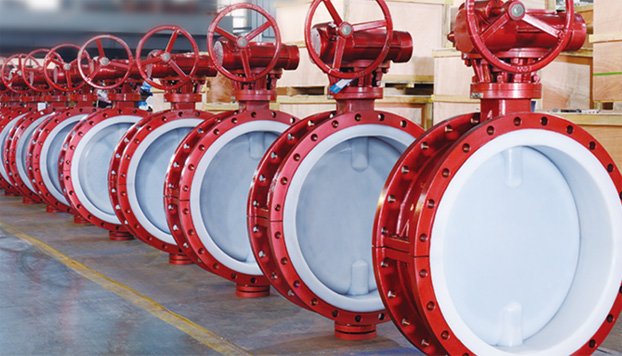How to choose corrosion-resistant valves? The media transported by various pipelines in the chemical industry usually have a certain degree of corrosiveness, such as sulfuric acid, hydrochloric acid, nitric acid and other corrosive media. All corrosion prevention is the most basic requirement for chemical equipment. Of course, chemical valves are no exception, and the material selection of valves must be corrosion-resistant. Improper selection of chemical valves can result in damage to equipment, serious accidents, and injuries to machinery, equipment, and even personnel. However, the selection of valves varies for different corrosive media. Corrosion resistant valves can be mainly divided into fluorine lined valves, rubber lined valves, stainless steel valves, etc. Fluorine lined valves are mainly fluorine lined butterfly valves and fluorine lined ball valves; Rubber lined valves mainly include rubber lined butterfly valves and diaphragm valves; There are many types of stainless steel valves, mainly ball valves, gate valves, globe valves, and regulating valves
How to choose corrosion-resistant valves? Hydrochloric acid: Most metal materials, including various stainless steel materials, are not resistant to hydrochloric acid corrosion, and high silicon ferrosilicon can only be used for 30% hydrochloric acid below 50 ℃. Unlike metallic materials, most non-metallic materials have good corrosion resistance to hydrochloric acid, so lined valves (such as fluoroplastics) are the best choice for transporting hydrochloric acid. However, if the temperature of the medium exceeds 150 ℃ or the pressure exceeds 16 kilograms, any plastic (including chlorinated plastics and even polytetrafluoroethylene) will be difficult to handle. Hydrochloric acid that exceeds this condition is not available on the market. How to choose corrosion-resistant valves for ideal valves?
Sulfuric acid: As one of the highly corrosive media, sulfuric acid is an important industrial raw material with a wide range of applications. The corrosion of materials varies greatly with different concentrations and temperatures of sulfuric acid. For concentrated sulfuric acid with a concentration greater than 80% and a temperature less than 80 ℃, carbon steel and cast iron have good corrosion resistance, but are not suitable for high-speed flowing sulfuric acid, Not applicable to valve materials, ordinary stainless steels such as 304 and 316 also have limitations on the use of sulfuric acid media. Therefore, pumps and valves for transporting sulfuric acid are usually made of high silicon cast iron (difficult to cast and process), high alloy stainless steel (No. 20 alloy valve), fluoroplastics, etc., which have good sulfuric acid resistance. choice. If the pressure is too high and the temperature rises, the use point of plastic valves will be affected, so we can only choose ceramic ball valves that are much more expensive than them. Valve selection for strong acid and strong alkali
The choice of anti-corrosion valves is nitric acid: Most common metals will be rapidly corroded and damaged in nitric acid. Stainless steel is the most widely used nitric acid resistant material. Has good corrosion resistance to all concentrations of solid acid at room temperature. It should be noted that copper containing stainless steel (such as 316, 316L) has no better corrosion resistance to acid than ordinary stainless steel (such as 304, 321), and sometimes even better
Selection of strong acid and strong alkali valves: Acetic acid is one of the most corrosive substances in organic acids. Ordinary steel will be severely corroded in acetic acid of various concentrations and temperatures. Stainless steel is an excellent material resistant to acetic acid. 316 stainless steel containing aluminum is also suitable for high temperature and dilute acetic acid vapor. For high temperature, high concentration acetic acid or other corrosive media, high alloy stainless steel or fluoroplastic pumps can be selected.
Saltwater/seawater: The corrosion rate of ordinary steel in chloroform, seawater, and saltwater is not too high. Usually, coatings must be used to protect various types of stainless steel. The uniform corrosion rate is also very low, but localized corrosion may be caused by atmospheric ions, and aluminum bronze or 316 stainless steel is usually better used.
How to choose corrosion-resistant valves? If you need anti-corrosion valves, you can take a look at our lined valve series or contact us to choose
